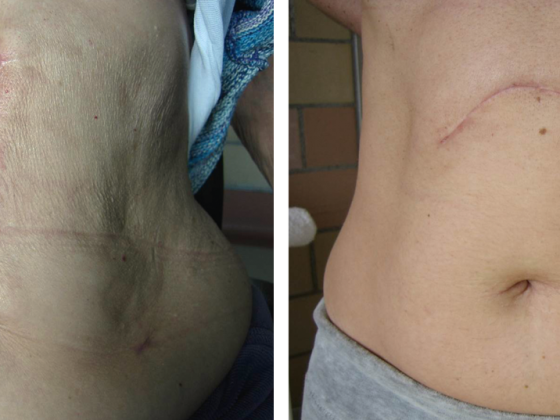Dozens of new study results were presented at this year’s European Society of Hypertension (ESH) and International Society of Hypertension Congress in Athens. The focus was not only on high blood pressure, but also on other cardiovascular risk factors such as diabetes, atrial fibrillation, metabolic syndrome and obesity.
(ee) Hypertension and diabetes mellitus are two conditions that increase the risk of sexual dysfunction. But independent of these two factors, what risk factors contribute to sexual dysfunction in hypertensive type 2 diabetic patients? In the study by Gavriilaki et al. [1], 281 corresponding patients (60.5% women, 39.5% men) who visited a hypertension outpatient clinic were interviewed using questionnaires about sexual dysfunction. In addition, depression and anxiety disorders were evaluated. The average age was 67 (±10) years. The vast majority of patients (88.6%) suffered from sexual dysfunction. Independent risk factors for sexual dysfunction were female sex, age, anxiety disorders, and depression. The authors suggest screening type 2 diabetics for the presence of sexual dysfunction – with special attention to risk factors.
Saxagliptin improves retinal blood flow
Patients with diabetes are at increased risk for microvascular complications. Early changes in microvascularization include hyperperfusion (e.g., in retina and kidneys). This study investigated the effect of the DPP-4 inhibitor saxagliptin on early retinal microvascular changes [2].
Forty-two type 2 diabetic patients (diagnosed for an average of 4 years) without clinical signs of microvascular changes were randomized into two groups. Some received 5 mg of saxagliptin daily for six weeks, while others received placebo. Retinal capillary blood flow, retinal arteriolar structure, and central hemodynamics were studied by various methods. Saxagliptin treatment significantly reduced postprandial blood glucose levels and HbA1c, as well as retinal capillary blood flow. Vasodilatory capacity was increased twofold in the saxagliptin group, and central systolic blood pressure was also significantly reduced in the verum group. The authors conclude that six weeks of treatment with saxagliptin in type 2 diabetic patients can normalize blood flow in retinal capillaries and improve central hemodynamics.
Fit diabetics are less likely to have atrial fibrillation
Type 2 diabetes is a risk factor for atrial fibrillation (AF). Some studies suggest that endurance training may help trained individuals develop VCF less frequently than untrained individuals. However, the relationship between physical fitness and VHF in diabetic patients has not yet been investigated.
In a Greek-American study, 1800 men with type 2 diabetes and a normal sinus rhythm underwent performance testing [3]. During the mean follow-up of 7.7 (±4.9) years, VCF occurred in 128 (7.2%) subjects. They were divided into three groups based on their fitness: low (≤20%), moderate (20.1-79.9%), and high fitness (≥ 80%). The relationship between fitness and risk of VHF was inverse: the better the fitness level, the lower the risk of VHF. The subjects with high fitness had a 72% lower risk of VHF than the less fit study participants, and the subjects with moderate fitness still had a 46% lower risk.
What is the prognostic value of blood pressure values measured at night?
It is controversial whether daytime systolic blood pressure (DSBP) measured in ambulatory settings can cause cardiovascular events independently of nocturnal systolic blood pressure (NSBP) or nocturnal systolic blood pressure (SBP) measured in ambulatory settings. be able to predict blood pressure values (CSBP) measured in the clinic. Nine cohort studies involving 13 800 patients were included in the present meta-analysis [4]. NSBPs independently predicted cardiovascular events such as coronary heart disease and stroke, but DSBPs and CSBPs did not.
24-hour blood pressure measurement: at the wrist or on the upper arm?
24-hour ambulatory blood pressure measurements are an important tool for monitoring patients with hypertension, but not all patients tolerate a monitor on the upper arm. In this study, an upper arm and a wrist measurement device were evaluated for measurement accuracy and patient acceptance [5].
Fewer valid measurements were obtained overall with the wrist device than with the upper arm device (total 53±15% valid measurements vs. 94±4%). The measurement data of the two devices were compared: Regarding the systolic values, there were no differences in the 24-hour blood pressure resp. in the measured values during sleep or wakefulness. Diastolic values were slightly higher in the wrist than in the upper arm measurements, but patients found the wrist device more comfortable. The authors judge wrist measurement to be legitimate in terms of increasing patient acceptance, but caution that too few valid readings could be a problem.
Lowering blood pressure in the very elderly: lower is not better
In the PARTAGE study, it was recently shown that mortality in people over 80 years of age living in nursing homes is increased at lower systolic or diastolic blood pressure levels. This raises the question of whether the frail elderly are overtreated for hypertension, as this group of people is highly vulnerable to polymedication and iatrogenic problems. In the present study, 1126 people over 80 years of age (mean age 88 years, 874 women) living in nursing homes were followed up during two years [6]. During this period, 247 people died.
Study participants were divided into those with (n=896) and those without (n=230) antihypertensive therapy, and three groups were distinguished with low, moderate, or high blood pressure levels. In untreated subjects, there was no mortality difference among the three groups. The situation was different in the treated study participants: In the group with the lowest blood pressure values (<120 mgHg), mortality was significantly increased compared to the groups with medium or high values (by 49 and 54%, respectively!).
The authors concluded from these results that in the very elderly with high frailty, drug-induced blood pressure reduction to <120 mmHg is associated with a 50% increase in mortality. The question arises whether aggressive blood pressure lowering with multiple medications is not harmful in this very vulnerable patient group, as it upsets the fragile health of these patients.
Overweight people think faster
A high BMI is a risk factor for cardiovascular disease. But how does BMI affect cognitive function? In an Italian study, 500 individuals from the general population (mean age 61 years, 56% women) were assessed for cognitive function, including mini mental test, clock test, and various memory and language tests [7]. In addition, some physical and laboratory parameters were recorded (BMI, waist-hip ratio, blood pressure, heart rate, glucose and cholesterol levels, etc.).
Surprisingly, individuals in the group with the highest BMI (5th quintile) performed best on almost all cognitive tests. The authors note that a high BMI appears to have a beneficial effect on attention, executive functions, and language skills. The reasons for this are unknown.
Brain stroke: How does blood pressure affect prognosis?
There is no consensus on the values to which blood pressure should be adjusted in ischemic stroke, as relevant studies have yielded conflicting results. In the present study, the association between blood pressure at hospital admission, maximum blood pressure, blood pressure at discharge, and mortality was investigated in patients with a first-ever ischemic stroke [8]. Study participants were 532 consecutive patients with a first-time stroke, 59% of whom were men. The follow-up was 66 weeks.
Patients who had mean blood pressure below 100 mmHg at entry had a significantly increased risk of mortality compared with patients with higher blood pressures. Also, the risk of death was increased in individuals who had systolic blood pressure below 120 mmHg at discharge.
Therapy-resistant hypertension: renal denervation or medication?
Renal denervation (RD) is being promoted as a new treatment for treatment-resistant hypertension. However, whether RD is superior to optimized drug treatment has not yet been determined. Norwegian investigators studied the continued treatment of 69 patients with refractory hypertension (TRH) [9]. This was defined as follows: systolic blood pressure values >140 mmHg, measured in the office, despite maximum tolerated dosage of at least three antihypertensive drugs, one of which was a diuretic. Patients with secondary hypertension were excluded. Also excluded were 20 patients whose blood pressure normalized after they each took their medication under observation. The remaining patients underwent RD or clinically adjusted drug treatment.
The study was stopped early because the blood pressure-lowering effect of RD was unclear and significantly lower than the blood pressure reduction in patients with optimized drug therapy (RD: baseline: 156±13/91±15 mmHg, after 6 months: 148±7/89±8 mmHg. Medications: Baseline: 160±14/88±13 mmHg, after 6 months: 132±10/77±8 mmHg). The authors caution that in patients with TRH, optimized treatment with medications may lower blood pressure better than renal denervation.
Those who sleep longer stay healthy longer
Sleep duration is thought to be related to the development of metabolic disorders, but to date there have been no prospective studies on this question. In the present population-based longitudinal study, nearly 2600 adults (age between 40 and 70 years, no metabolic syndrome) were followed up for an average of 2.6 years [10]. The baseline survey asked about the average daily sleep duration.
All study participants were divided into four groups: with less than 6 hours of sleep, with 6-8 hours of sleep, with 8-10 hours of sleep, and with more than 10 hours of sleep. At follow-up, 21.6% of participants had developed metabolic syndrome. In the group with sleep duration less than 6 hours, the risk of metabolic syndrome was significantly higher than in the group with 6-8 hours of sleep (OR 1.41; CI 95%). The authors suggest that short sleep duration is an independent risk factor for metabolic syndrome.
Source: Joint Meeting European Society of Hypertension (ESH) /International Society of Hypertension (ISH), June 13-16, 2014, Athens.
Literature:
-
Gavriilaki E, et al: Risk factors of sexual dysfunction on hypertension and type 2 diabetes mellitus. J of Hypertension 2014; 32: e-Suppl 1, para 1A 02.
-
Ott C, et al: Effects of the DPP-4 inhibitor saxagliptin on erly vascular changes in the retinal and systemic circulation. J of Hypertension 2014; 32: e-Suppl 1, para 1A 09.
-
Pittaras A.: et al. Increase exercise capacitiy lowers the risk for atrial fibrillation in men with type 2 diabetes mellitus. J of Hypertension 2014; 32: e-Suppl 1, para 1B 01.
-
Roush G, et al: Prognostic impact of clinic, daytime, and nighttime systolic blood pressure in 9 cohorts of 13844 patients with hypertension: systematic review and meta-analysis. J of Hypertension 2014; 32: e-Suppl 1, para 1D 02.
-
Zeng W, et al: Comparison of wrist-type and arm-type ambulatory blood pressure monitoring device. J of Hypertension 2014; 32: e-Suppl 1, para 1D 08.
-
Benetos A, et al: Association between mortality and blood pressure levels in elderly nursing home subjects. Are frail subjects overtreated (Partage Study)? J of Hypertension 2014; 32: e-Suppl 1, para 2B 01.
-
Tikhonoff V, et al: High body mass index is associated to better coognitive function at a population level. J of Hypertension 2014; 32: e-Suppl 1, para 2C 02.
-
Wohlfahrt P, et al: Low mean blood pressure during the acute period of ischemic stroke is associated with decreased survival. J of Hypertension 2014; 32: e-Suppl 1, para 2C 09.
-
Fadl Elmula F, et al: Adjusted drug treatment is superior to renal sympathetic denervation in patients with true treatment-resistant hypertension. J of Hypertension 2014; 32: e-Suppl 1, para 3A 01.
-
Kim J, et al. : Prospective study of total sleep duration and incident metabolic syndrome : the arirang study. J of Hypertension 2014; 32: e-Suppl 1, Abs. 4B 03.
CARDIOVASC 2014; 13(4): 35-38











